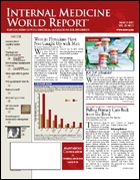Methionine-Rich Diet May Fend Off Pancreatic Cancer
Vitamin B6 Has No Effect
Increased dietary intake of methionine—an essential sulfur-containing amino acid found in meat, fish, poultry, legumes, and dairy products—reduces the risk for pancreatic cancer, according to new data from the first large study to examine the relationship between this lethal cancer and dietary intake of methionine.
Gastroenterology
This prospective, population-based study was prompted by previous evidence that linked dysfunctional methyl-group metabolism to the cellular differentiation in the pancreas that sets off a chain of events that ends in carcinogenesis. The investigators already demonstrated that folate, one of the dietary contributors to methyl-group metabolism, was inversely related to the risk of pancreatic cancer (J Natl Cancer Inst. 2006; 98:407-413). Their new results are from an analysis of 2 other dietary contributors to methyl-group metabolism—methionine and vitamin B6 (. 2007; 132:113-118).
The study included 81,922 Swedish men and women (aged 45-83 years), none of whom had cancer when they were recruited in 1997. Based on food-frequency questionnaires that were completed at baseline, the participants were divided into 4 groups by dietary and supplemental vitamin B6 intake and dietary methionine. Data were analyzed using Cox proportional hazards models to calculate rate ratios, adjusting for potential confounding factors such as age, smoking status, and body mass index.
At an average follow-up of 7 years, 147 new cases of pancreatic cancer were diagnosed. There was a significant inverse relationship between methionine intake and risk of pancreatic cancer, with individuals in the highest quartile of methionine intake having less than half the risk of pancreatic cancer than those in the lowest quartile. There was no significant association between dietary and/or vitamin B6 supplementation intake and pancreatic cancer.
Subanalysis showed that the inverse relationship between dietary methionine and pancreatic cancer risk was strongest in those who had never smoked. The investigators note that cigarette smoking can reduce folate, vitamin B6, and vitamin B12 status, thereby influencing methyl-group availability.
The implications of these findings could be profound. Pancreatic cancer now ranks as the 4th leading cause of cancer death in the United States.
IMWR
“We know less about diet and pancreatic cancer than we would like to know,” Albert B. Lowenfels, MD, professor of surgery, New York Medical College, Valhalla, NY, and the coauthor of an accompanying editorial (pages 441-443), tells . “What we do know is that smoking doubles the risk of pancreatitis, and heavy drinking causes pancreatitis, a risk factor for pancreatic cancer. These factors should be avoided.”
Although this study “provides valuable information about a dietary component that might reduce the risk of pancreatic cancer,” the editorialists contend that the findings are far from definitive. Remaining questions include:
• Could the apparent protective effect of methionine have been the result of another dietary or nondietary factor?
• Could higher levels of methionine increase morbidity or mortality from nonpancreatic disease?
• Since the body converts methionine to homocysteine, could high intakes increase the risk for cardiovascular disease?
• Does methionine increase the risk of gastric and other cancers, as limited evidence suggests?
While awaiting the answers, should primary care physicians tell patients with a family history of pancreatic cancer about the possible benefits and risks of methionine?
“Of course patients can make their own decision on this issue, and I believe a form of methionine is available without prescription,” Dr Lowenfels says. “They even sell it for cats and dogs.”
